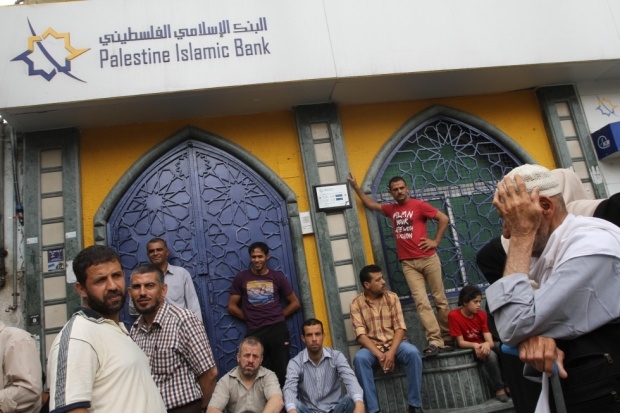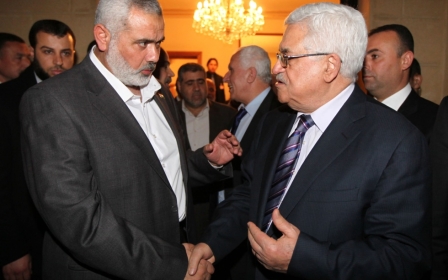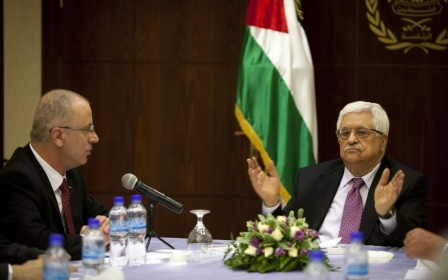Palestinian unity government faces boycott threats over Hamas wages

The international community has threatened to boycott the Palestinian leadership if it pays the salaries of former Hamas employees in Gaza, prime minister Rami Hamdallah told AFP on Sunday.
In an exclusive interview, Hamdallah said he had been warned he would face problems if he visited the Gaza Strip without first regulating the problem of the salaries.
News of the potential boycott comes after Palestinian President Mahmoud Abbas threatened late Saturday to break off the Palestinian unity agreement with Hamas if the group does not allow the government to operate properly in the Gaza Strip.
"We cannot continue working with Hamas this way," Abbas said on arrival to Cairo where he is scheduled to meet with Arab League foreign ministers to discuss both the unity agreement with Hamas as well as renewed peace negotiations with Israel.
"There are 27 undersecretaries of ministries who are running the Gaza Strip, and the national unity government cannot do anything on the ground," Abbas said.
Hamdallah, who heads the Palestinian government of national consensus which took office on 2 June, said the problem of the wages had turned into the main stumbling block to an intra-Palestinian reconciliation deal.
Since signing the agreement in April, Hamas has demanded the new government take responsibility for paying its 45,000 employees, some 27,000 of which are civil servants, he said. The rest are understood to be members of the Hamas police and security forces.
Before the Hamas government stepped down in June, it had been unable to pay their wages for months due to a biting economic crisis.
As of late June, before the war in Gaza started, many of the government workers had not been paid in seven months while others had received only partial pay. Hamas officials had estimated at the time that the workers could be owed as much as $1 billion in back payments.
As many as 600,000 Gazans who are members in government workers' families - or an estimated 36 percent of the Gazan population - have been impacted by the pay freeze.
In the weeks between the agreement on the Palestinian unity government and the start of the war in Gaza, tensions erupted several times, including walk outs by Gaza public sector workers and clashes between Palestinian Authority workers in Gaza, who were collecting their paychecks, and Hamas security officers.
Hamdallah said his government had been warned against channelling any money to anyone employed by Hamas, which is blacklisted by the US and Europe as a terror organisation.
"The government and the banks operating in the Palestinian territories were warned that if they make these payments to former Hamas government employees in Gaza then the government and the people will be boycotted," he said.
"If this happens, the Palestinian banking system will face a huge problem that will threaten the Palestinian situation in general," he told AFP.
The Palestinians are heavily dependent on international aid with a boycott likely to have a devastating financial impact on its financial viability.
At the end of August, a senior Palestinian official told AFP that the government wanted to pay the wages in question, but was looking for "guarantees" that in doing so, it would not jeopardise international aid.
But the official said an unidentified "third party" was working to solve the crisis by delivering the payments, with "positive indications" it would be resolved soon.
Hamas's insistence on including the employees on the payroll of the new administration was "the main problem preventing the government from working in the Gaza Strip," Hamdallah said.
His remarks came a day after president Mahmoud Abbas lashed out at Hamas for effectively running a parallel administration and preventing the consensus government from operating in Gaza.
In June, Qatar said it would contribute a total of $60 million (44 million euros) towards the payment of the Gaza salaries, although so far, no money has been transferred.
Hamdallah, a 56-year-old former academic, said some ministers in the consensus administration had been unable to exercise their authority in Gaza.
"President Abbas and myself want ministries in Gaza to work as they do in the West Bank, but for that, staff need to take their instructions from the minister," he said.
"Some of them continue to follow the instructions of ministers of the former Hamas government."
New MEE newsletter: Jerusalem Dispatch
Sign up to get the latest insights and analysis on Israel-Palestine, alongside Turkey Unpacked and other MEE newsletters
Middle East Eye delivers independent and unrivalled coverage and analysis of the Middle East, North Africa and beyond. To learn more about republishing this content and the associated fees, please fill out this form. More about MEE can be found here.



